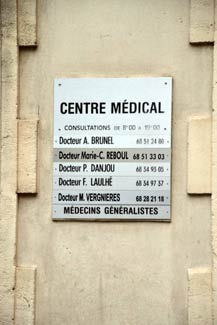No Bones About It

"It's just right up the street," says Tracey Harding as the iron door closes with a clink. Harding, an employee at the Académie de Langue France Méditerranée, and I continue on our way to the medical clinic.
After a week of walking on an injured foot, I feel a throbbing sensation as I limp along the gravel road toward a simple brick building with an iron door. I walk inside, hesitantly glancing into the hallway as Harding studies the schedule posted nearby. Straight ahead I see majestic frosted double doors that captivate my interest. "That must be where the doctors are, " I think.
Following Harding's direction I make a left turn to see a bland white room, stuffed with the sick and injured residents of Perpignan. At this overwhelming sight I turn around to find another room that is equally as as crowded. "I think we should come back," insists Harding.
At four o'clock, we return and finally sit down in the now barren room to wait for the doctor. Harding explains that we are at a medical clinic and do not need an appointment. Patients simply show up and wait in line to see the doctor of their choice. As if on cue, a doctor swiftly enters the waiting room to call our only company, a family of three, behind the mysterious doors.
About 15 minutes later it is my turn to see the doctor. Adorned in jeans, a polo, and a youthful smile, Dr. Vergnieres seems to be less formal and more friendly than many of the stuffy physicians that I have seen in the past. He comfortably chats with Harding as we head back to his neatly organized office, which perfectly contrasts his casual attire.
The visit continues in his examination room, conveniently connected to his office. At the end of the appointment he prints off my receipt and prescription and says, "23 Euros please," with his thick French accent. I lay the bills on the counter as he reaches in his drawer to efficiently deliver my change.
My first doctor's visit in Perpignan, and my first experience with a physician outside the United States, was an eye-opening adventure. There was no receptionist, appointment, nurse or insurance, and certainly no forms to fill out. I felt disoriented and frustrated, questioning how the World Health Organization could rank France No. 1 in overall health care out of 191 countries if they do not even have receptionists or nurses. In addition, the London School of Hygiene ranked France first place out of 19 countries in a study on "amendable mortality."
After three doctors visits in one week, I feel much more comfortable with Perpignan's health care system and medical community. Despite my original concerns, I find that their system is actually quite functional. Dr. Vergnieres spent about 20 minutes with me, explaining his thoughts and making an effort to accommodate me by speaking the little English he knew. In fact, I feel like I know him better after just a few visits than many physicians that I have seen for years.
And no bones about it, I didn't miss filling out the paperwork at all.
Recent Posts
The Sculptor and his Wife by Mary Barczak
The Language Barrier by Jim Cameron
The Sixth Sense: Understanding by Christina Cocca
Bastille Day Bees by Annie Petersen
Reaching New Heights by Sarah Raghubir
Vive Perpignan by Chelsea Boone
The Changing Collioure Art Scene by Ariana Bacle
Having a Boule with Pétanque by Kristin O'Brien
Corridas in the 21st Century by Victoria King
Controversy Fermenting? by Marika Washchyshyn
SDF in Perpignan by Maegan Simmons
A Different Culinary Landscape by Simon Arseneau
Student Pages
Simon Arseneau
Ariana Bacle
Mary Barczak
Chelsea Boone
Jim Cameron
Christina Cocca
Justine Dhollande
Su Kim
Victoria King
Kristin O'Brien
Annie Petersen
Sarah Raghubir
Alexis Sanchez
Maegan Simmons
Marika Washchyshyn
About the Program
Fifteen college students from the U.S. and Canada are producing multimedia journalism and learning French in Perpignan. To learn more, read a welcome letter from program director Rachele Kanigel, and meet the faculty.

